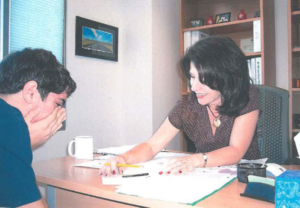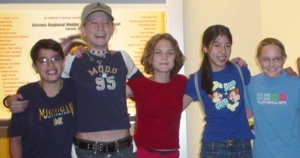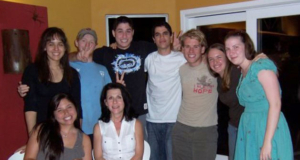“Unbounded Opportunity: Notes from Our Alumni” is a Vectors series in which teachers or school managers catch up with former students about their lives and choices after they graduate from BASIS.ed schools. If you’d like to interview a former student, or are an alumni and would like to participate, please email us at [email protected].
Andrew Shabilla was a 6th grader when BASIS Scottsdale was founded in 2003, and attended 6th-8th grade at our second school; Diane Moser was his Head of School. Andrew then left the program in 2006 for one year, because the fledgling but thriving BASIS.ed Legacy School hadn’t yet opened its high school campus. When BASIS Scottsdale moved from its location at 90th Street and Via Linda to its longtime home (until this spring!) on 136th Street, and added high school grades, Andrew came back for 10th-12th grade, and graduated in 2010.

Andrew Shabilla: Well, after I left BASIS Scottsdale, I studied chemical engineering at Arizona State and graduated in 2014. I’m working now as a process engineer for Texas Instruments in the wafer lab. We make computer chips that go into all kinds of devices, from cars to washing machines to cell phones. Etc. It’s actually an incredibly complex process that, depending on the device you’re making, can take hundreds of thousands of discrete steps.
My job is to monitor the health of the manufacturing line and the hundreds of process tools that handle the wafers. We do this through sampling along the whole line – almost like quality control, but we look for defects and trace them back to their source and notify the people responsible to work on their issue.
There is quite a bit of data analysis and pattern recognition that is needed to do the job well. It’s fast paced, and can be very stressful.
I learned a lot of the skill I needed in engineering school, but not in the way you might think. The calculations and simulations we did for homework problems don’t really come up in my work at all. The most math that I use these days can all be done mentally. The ability to sit at a challenge for hours at a time, late through the night, having to answer to stressful conditions, is the most valuable skill to get out of school. That and knowing how to do a job the right way. These are what you get out of engineering school. Most of the time, you’re not really expected to have specific knowledge. In a few months, you’ll pick up most of what you need to know to do your job.
DM: Are you surprised by this?
AS: Yes! I didn’t expect to go into the semiconductor industry, though I never really had any grand plans for what I wanted to do. I really didn’t know what to expect coming into this job either, so there have been a lot of surprises.
DM: Did your education at BASIS Scottsdale help you reach this phase?
AS: I’d say so. Part of the job I enjoy most is theorizing about where certain odd defects come from. It requires reaching way back into theory in search of something to fit what we’re seeing.

Academics aside, it was nice to be surrounded by other BASIS Scottsdale students who had similar drive. Even if we didn’t always share the same interests, it was beneficial to be around people who had a similar disposition. That was nice. Really nice.
DM: What might be next for you, Andrew?
AS: I think I’m going to go to grad school; that’s very likely. Whether that will be a Master’s or a Ph.D. is still up in the air. But I’d like to get back into doing applied research at the bench. My foray into theory for the past couple years has been interesting, but my passion is for hands-on work.
DM: When you chat with friends about middle school and high school, what stories do you tell them, and who or what comes into your mind?
AS: We talk about how close we were as a group – and we were close from 6th grade on. We still keep in touch with many of our teachers, and we talk about how our teachers were our partners in our success. It’s so true. We are all still very good friends and because we were so small and were there from the very beginning – we feel like family.

Thanks again for doing this, Andrew! So great to catch up!
AS: I love catching up, D-Mose. You’re welcome!
Once again, if you know a BASIS.ed alum whom you’d like to profile or think we should profile, or you are an alum and want to catch up, please feel free to email us at [email protected].
- Unbounded Opportunity Notes from Our Alumni (Vol. 4 – Andrew Shabilla) - August 2, 2016
- Unbounded Opportunity Notes from Our Alumni (Vol. 3 – Arriana Tuomey) - June 17, 2016
- Unbounded Opportunity Notes from Our Alumni (Vol. 2 – Jeff Besson) - April 30, 2016
- Unbounded Opportunity Notes from Our Alumni (Vol. 1 - Anne Justine Houser) - April 19, 2016